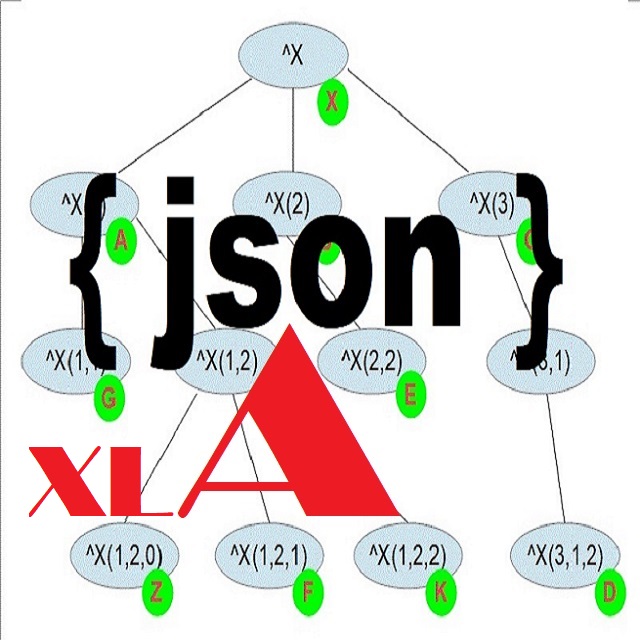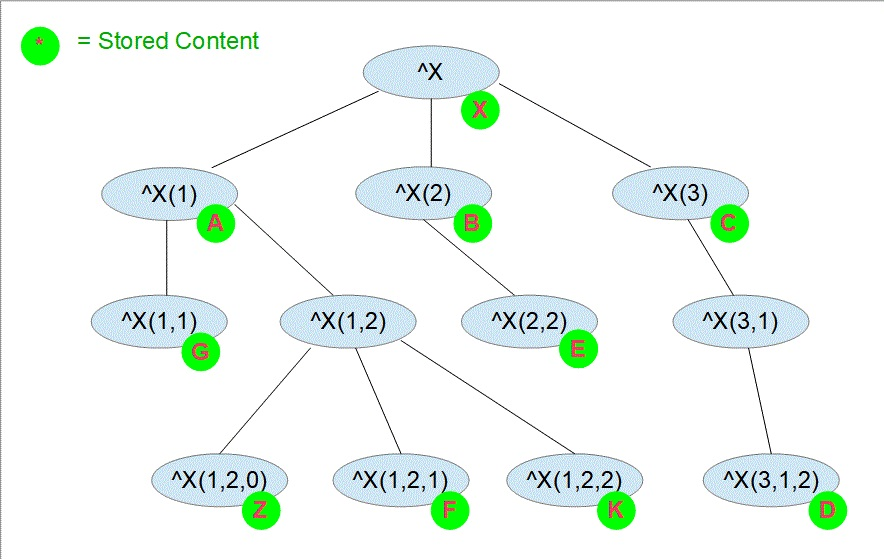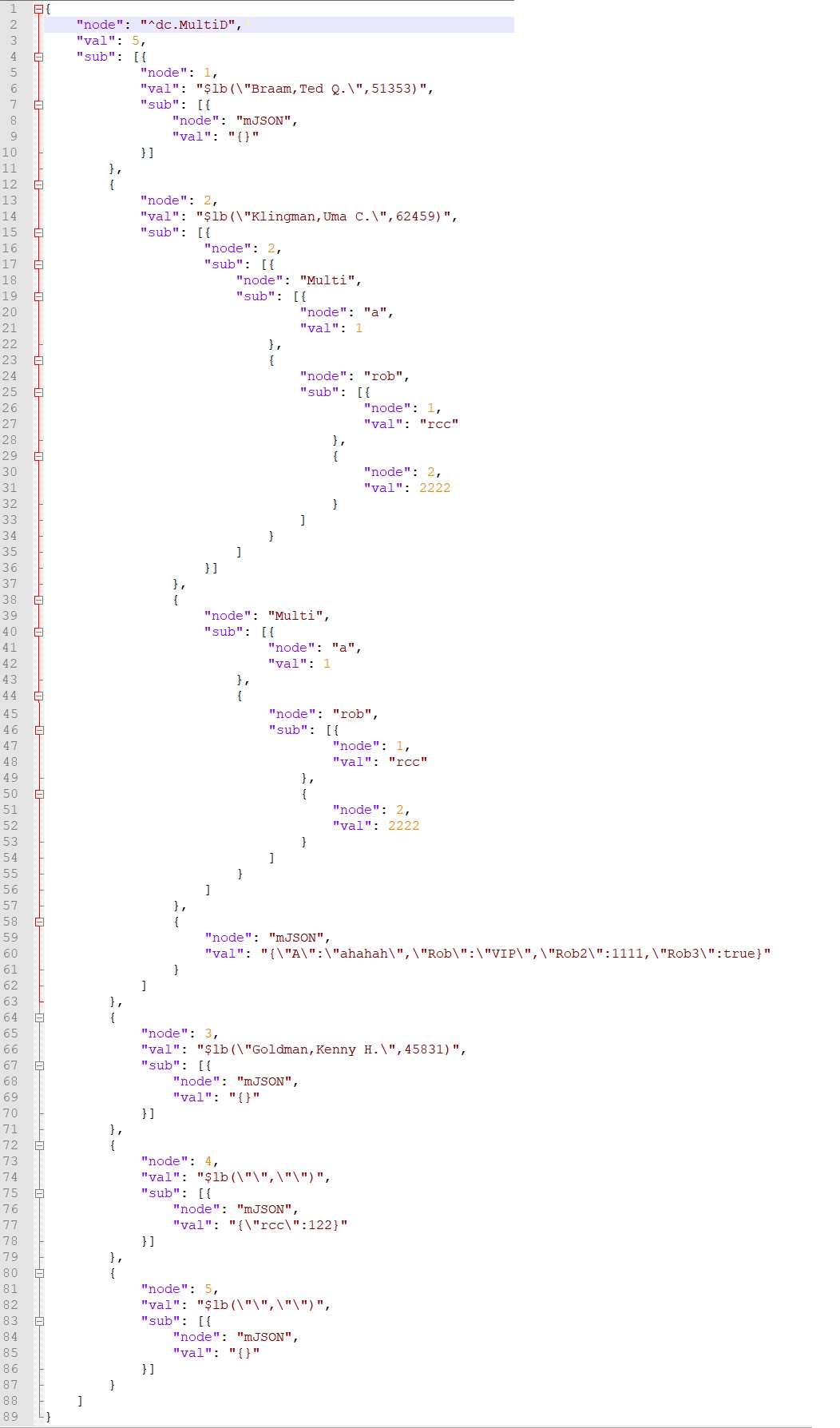
GlobalToJSON-XLA  Works
Works
 Works
Works


 4
4 1
1
What's new in this version
archived

no maintenance or update
GlobalToJSON-XL-Academic
This package offers a utility to export an XLarge Global into a JSON object file and to show or import it again.
In a previous example, this all was processed in memory. But if this is a large Global you may either
experience <MAXSTRING> or an <STORE> error if the generated JSON structure exceeds available memory.

Academic refers to the structure created.
- each node of the Global including the top node is represented as a JSON object
- {“node”:<node name>,“val”:<value stored>,“sub”:[<JSON array of subscript objects>]}
- value and subscript are optional but one of them always exists for a valid node
- the JSON object for the lowest level subscript has only value but no further subscript.
So this is basically a 1:1 image of your global and it’s exported to a file (default: gbl.json)
In addition to the export, a show method displays the generated file.
The tricky part is the import from file. It is a customize JSON parser as all others just
operate in memory. this fails with a reasonable-sized Global
(eg. ^oddDEF with ~ 1.7 million nodes takes ~ 78MB JSON file.)
Prerequisites
Make sure you have git and Docker desktop installed.
Installation
Clone/git pull the repo into any local directory
git clone https://github.com/rcemper/GlobalToJSON-XLA.git
Run the IRIS container with your project:
docker-compose up -d --build
How to Test it
This is the pre-loaded Global ^dc.MultiD for testing.
There are 3 methods available
- ClassMethod export(gref As %String = “^%”, file = “gbl.json”) As %String
file = 0 >>> display to terminal - ClassMethod show(file = “gbl.json”) As %String
- ClassMethod import( file = “gbl.json”, test = 0) As %String
test = 1 >>> load into a PPG
Open IRIS terminal
$ docker-compose exec iris iris session irisUSER>write ##class(dc.GblToJSON.XLA).export("^dc.MultiD")
File gbl.json createdUSER>write ##class(dc.GblToJSON.XLA).export("^dc.MultiD",0)
{"node":"^dc.MultiD"
,"val":5
,"sub":[
{"node":1
,"val":"$lb("Braam,Ted Q.",51353)"
,"sub":[
{"node":"mJSON"
,"val":"{}"
}
--- truncated ---
USER>>write ##class(dc.GblToJSON.XLA).show()
{"node":"^dc.MultiD"
,"val":5
,"sub":[
{"node":1
,"val":"$lb("Braam,Ted Q.",51353)"
--- truncated ---
validated JSON object

Now we want to verify the load function as a test into a PPG
USER>write ##class(dc.GblToJSON.XLA).import(,1) Global ^||dc.MultiD loadedUSER>zwrite ^||dc.MultiD
^||dc.MultiD=5
^||dc.MultiD(1)=$lb("Braam,Ted Q.",51353)
^||dc.MultiD(1,"mJSON")="{}"
^||dc.MultiD(2)=$lb("Klingman,Uma C.",62459)
^||dc.MultiD(2,2,"Multi","a")=1
^||dc.MultiD(2,2,"Multi","rob",1)="rcc"
^||dc.MultiD(2,2,"Multi","rob",2)=2222
^||dc.MultiD(2,"Multi","a")=1
^||dc.MultiD(2,"Multi","rob",1)="rcc"
^||dc.MultiD(2,"Multi","rob",2)=2222
^||dc.MultiD(2,"mJSON")="{""A"":""ahahah"",""Rob"":""VIP"",""Rob2"":1111,""Rob3"":true}"
^||dc.MultiD(3)=$lb("Goldman,Kenny H.",45831)
^||dc.MultiD(3,"mJSON")="{}"
^||dc.MultiD(4)=$lb("","")
^||dc.MultiD(4,"mJSON")="{""rcc"":122}"
^||dc.MultiD(5)=$lb("","")
^||dc.MultiD(5,"mJSON")="{}"
USER>
q.a.d.

 download archive
download archive  PassedView report
PassedView report
